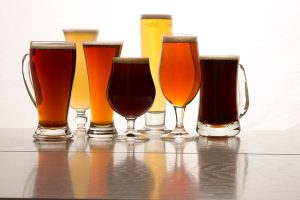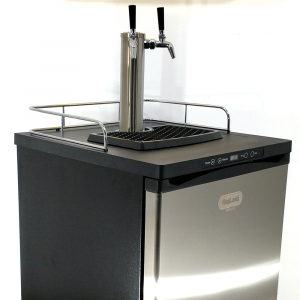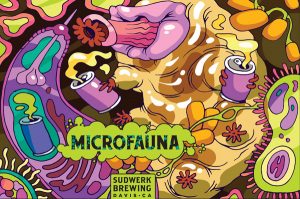 I like geeking out on glassware. We used to fill RateBeer forum threads with detailed and honest-to-god-100%-interested discussions of shape, volume, glass thickness, the benefits and drawbacks of nucleation points, whether those varietal-specific wine glasses were 100% or only partly bullshit… Important matters such as these. Does beer really taste different if it lands on a different section of my tongue first? Is the concavity of that shape improving the aromatics? God I miss that free time. More recently, I designed a few of my own glasses for a project I was doing, including a multicolored pattern on a stemless wine glass. It ended up being my favorite glass for photos, because you could spin it to match your beer: greens and reds popped with stouts; IPAs amplified blues and pinks, and the whole thing kinda glowed.
I like geeking out on glassware. We used to fill RateBeer forum threads with detailed and honest-to-god-100%-interested discussions of shape, volume, glass thickness, the benefits and drawbacks of nucleation points, whether those varietal-specific wine glasses were 100% or only partly bullshit… Important matters such as these. Does beer really taste different if it lands on a different section of my tongue first? Is the concavity of that shape improving the aromatics? God I miss that free time. More recently, I designed a few of my own glasses for a project I was doing, including a multicolored pattern on a stemless wine glass. It ended up being my favorite glass for photos, because you could spin it to match your beer: greens and reds popped with stouts; IPAs amplified blues and pinks, and the whole thing kinda glowed.
Before the pandemic, I would’ve pegged my go-to glassware as the Riedel Veritas beer glass I’d picked up maybe five years back. Featherweight (like some older Duvel glasses, and less fragile, thankfully), super thin, beautiful details, just a pleasure to drink from… Now, we’re a little less fussy. We’ve usually got an IPA pouring on our house’s kegerator, and a handful of curvy, medium-size nonics have become the go-to: the English-style pub glasses that are one of the fixtures at local brewpubs. Our most recent are from Russian River’s Windsor spot.
Glassware’s significance extends beyond beer. For every beverage, the choice of glassware involves considerations of various shapes and thicknesses. Take whiskey, for instance, where you have options for shots, and the timeless old-fashioned glasses retain their importance. And who can overlook the elegance of the Glencairn glass? The key is knowing when to use each type, which, in turn, requires a good understanding of whiskey varieties. To navigate this effectively, you can rely on Reviews by Whisky World.






